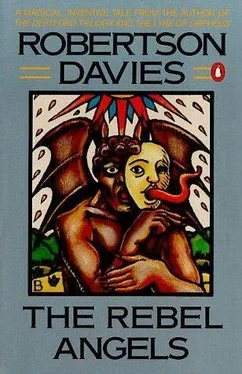Robertson Davies - The Rebel Angels
Здесь есть возможность читать онлайн «Robertson Davies - The Rebel Angels» весь текст электронной книги совершенно бесплатно (целиком полную версию без сокращений). В некоторых случаях можно слушать аудио, скачать через торрент в формате fb2 и присутствует краткое содержание. Жанр: Триллер, на английском языке. Описание произведения, (предисловие) а так же отзывы посетителей доступны на портале библиотеки ЛибКат.
- Название:The Rebel Angels
- Автор:
- Жанр:
- Год:неизвестен
- ISBN:нет данных
- Рейтинг книги:5 / 5. Голосов: 1
-
Избранное:Добавить в избранное
- Отзывы:
-
Ваша оценка:
- 100
- 1
- 2
- 3
- 4
- 5
The Rebel Angels: краткое содержание, описание и аннотация
Предлагаем к чтению аннотацию, описание, краткое содержание или предисловие (зависит от того, что написал сам автор книги «The Rebel Angels»). Если вы не нашли необходимую информацию о книге — напишите в комментариях, мы постараемся отыскать её.
The Rebel Angels — читать онлайн бесплатно полную книгу (весь текст) целиком
Ниже представлен текст книги, разбитый по страницам. Система сохранения места последней прочитанной страницы, позволяет с удобством читать онлайн бесплатно книгу «The Rebel Angels», без необходимости каждый раз заново искать на чём Вы остановились. Поставьте закладку, и сможете в любой момент перейти на страницу, на которой закончили чтение.
Интервал:
Закладка:
"Articles in learned journals; perhaps even a book."
"A book about the bomari?"
"No, no, not just about the bomari, but about all sorts of things like it that wise people like you have preserved for the modern world."
This was Gypsy flattery on my part, because Mamusia is convinced that she is uncommonly wise. She has proof of it; when she was born the ages of her father and mother, added together, amounted to more than a hundred years. This is an indisputable sign.
"He must be a strange teacher if he wants to teach about the bomari to all those flat-faced loafers at the University. They wouldn't know how to manage it even if they were told about it."
"Mamusia, he doesn't want to teach about it. He wants to write about it for a few very learned men like himself who are interested in the persistence of old wisdom and old belief in this modern world, which so terribly lacks that sort of wisdom. He wants to do honour to people like you who have suffered and kept silent in order to guard the ancient secrets."
"He's going to write down my name?"
"Never, if you ask him not to; he will say he learned so-and-so from a very wise woman he was so lucky as to meet under circumstances he has vowed not to reveal."
"Ah, like that?"
"Yes, like that. You know better than anyone that even if gadje knew about the bomari they could never make it work properly, because they haven't had your experience and great inherited wisdom."
"Well, little poshrat, you have started this and I suppose I must end it. I do it for you because you are Tadeusz's daughter. Nothing less than that would persuade me. Bring your wise man."
2
Bring my wise man. But that was only the beginning; I must manage the encounter between Mamusia and my wise man so that neither of them was turned forever against me. What a fool I had been to start all this! What a gadji fool! Would I get out of it with my skin, not to speak of the admiration and gratitude and perhaps the love I hoped to win from Hollier by what I had done? If only I had not wanted to add something to his research on the Filth Therapy! But I was in the predicament of the Sorcerer's Apprentice; I had started something I could not stop, and perhaps in the end the Sorcerer would punish me.
I had plenty of time to reflect on my trouble, for I had a whole evening with Mamusia, lying on my sofa and changing my poultice every half-hour or so, as she played her fiddle and occasionally sang.
She knew, in her cunning fashion, how irritating this was to me. I am an enthusiast for music, and I like it at its most sophisticated and intellectual; it is one of the few assurances of order in my confused world. But Mamusia's music was the true Magyar Gypsy strain, lamenting, mourning, yowling, and suddenly modulating into frenzied high spirits, the ringers sliding up the fingerboard in glissandi that seemed to be primitive screams of some sort of ecstasy that was never real to me. The Gypsy scale – minor third, augmented fourth, minor sixth, and major seventh – fretted my nerves; had not the diatonic scale sufficed for the noble ecstasy of J. S. Bach? I had to fight this music; its primitivism and sentimentality grated on everything the University meant to me; yet I knew it for an aspect of my inheritance that I could never root out, deny it though I might. Oh, I knew what was wrong with me, right enough; I wanted to be an intellectual, to escape from everything Mamusia and the generations of Kalderash behind her meant, and I knew I could do it only by the uttermost violence to myself. Even my agonizing concern with Hollier, I sometimes suspected, was chiefly a wish to escape from my world into his. Is that love, or isn't it?
Mamusia now turned to a kind of music that was deeply personal to herself; not the kind of thing she would ever, as a girl, have played in an officers' mess, or to the diners in a fashionable restaurant. She called it the Bear Chant; it was the music Gypsy bear-leaders played or sang to their animals, but I think it was something older than that; to those Gypsies so long ago the bear was not only a valuable possession and money-spinner, but a companion and perhaps an object of reverence. Is it unbelievable? Notice how some people talk to their dogs and cats nowadays; the talk is usually the sentimentality they think appropriate to a not very dangerous animal. But how would one talk to a bear which could kill? How would one ask it for friendship? How would one invite its wisdom, which is so unlike the wisdom of a man, but not impenetrable by a man? This was what the Bear Chant seemed to be – music that moved slowly, with long interrogative pauses, and unusual demands on that low, guttural voice of the fiddle, which is so rarely heard in the kind of music I understand and enjoy. Croak – croak; tell me, Brother Martin, how is it with you? What do you see? What do you hear? And then: Grunt – grunt, Brother Martin (for all Gypsy bears are called Martin) says his profound say. Would she ever play that for Hollier? And – I knew nothing of his sensitivity to such things – would Hollier make anything of it?
Bring my wise man; what would he make of the house in which I lived?
It was a big house and a handsome house, in the heavy banker-like style that prevails in the most secure, most splendidly tree-lined streets of the Rosedale district of Toronto. One Hundred and Twenty Walnut Street was not the handsomest, nor yet the simplest, of the houses to be found there. Solid brick, white-painted woodwork, impressively quoined at the corners; a few fine trees, well attended by professional tree-pruners and patchers; a good lawn, obviously planted by an expert, of fine grass without a weed to be seen. The very house, indeed, for a Polish engineer who had done well in the New World and wished to take the place in that world his money and ability and obvious respectability required. How proud Tadeusz had been of it, and how he had laughed gently when Mamusia said it was too big for a couple with one child, even with a housekeeper who lived in a flat all her own on the third floor. A good house, furnished with good things, and kept in the best of condition by contract cleaners and gardeners. And so it looked still to the passer-by.
Inside, however, there had been catastrophic changes. When Tadeusz died Mamusia had talked distractedly of selling it and looking for some hovel congruous with her widowed and financially fallen state. But her brother Yerko had told her not to be a fool; she was sitting on a fortune. It was Yerko who remembered that when Tadeusz bought the house, it had possessed a rating at City Hall as an apartment and rooming-house; this had been granted because of some temporary necessity, during the war years, and had never been revoked, even though Tadeusz had required the whole thing for his own occupancy. The thing to do, said Yerko, was to restore the place to its former condition as an apartment and rooming-house, and make money from it. The gadje always wanted nice places to live.
I do not know what its former condition had been, but after Mamusia and Yerko had finished with it One Hundred and Twenty Walnut Street was surely one of the queerest warrens in a city noted for queer warrens. To save money, Yerko did much of the work himself; he could turn his hand to anything, and with a labourer to help him he turned Tadeusz's beautiful, proud home into ten dwellings: the best apartment, consisting of a living-room, kitchen, and bedroom, and a sun porch, was Mamusia's own. On the ground floor there were, in addition, two bachelor apartments of kennel-like darkness and inconvenience, one of which had no less than seven corners, after the cupboard-like kitchen facility and the doll's bathroom had been created. These were rented to young men, Mr. Kolbenheyer and Mr. Vitrac; Kolbenheyer was skeletonic, and never spoke above a whisper; about Vitrac I had perpetual misgivings, because he looked like a man bent on suicide and his apartment would have been a perfect setting for a miserable departure.
Читать дальшеИнтервал:
Закладка:
Похожие книги на «The Rebel Angels»
Представляем Вашему вниманию похожие книги на «The Rebel Angels» списком для выбора. Мы отобрали схожую по названию и смыслу литературу в надежде предоставить читателям больше вариантов отыскать новые, интересные, ещё непрочитанные произведения.
Обсуждение, отзывы о книге «The Rebel Angels» и просто собственные мнения читателей. Оставьте ваши комментарии, напишите, что Вы думаете о произведении, его смысле или главных героях. Укажите что конкретно понравилось, а что нет, и почему Вы так считаете.












